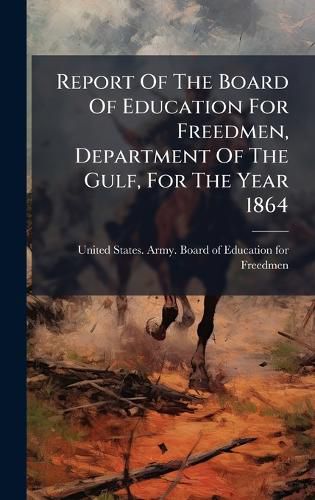Readings Newsletter
Become a Readings Member to make your shopping experience even easier.
Sign in or sign up for free!
You’re not far away from qualifying for FREE standard shipping within Australia
You’ve qualified for FREE standard shipping within Australia
The cart is loading…






This is the "Report Of The Board Of Education For Freedmen, Department Of The Gulf, For The Year 1864." This historical document offers a detailed account of the efforts to educate formerly enslaved people in the Department of the Gulf during the Civil War. The report provides insights into the challenges and achievements of establishing schools and educational programs for freedmen, highlighting the curriculum, teaching methods, and the impact of education on the newly emancipated population.
The Board of Education's work was crucial in the early stages of Reconstruction, aiming to provide African Americans with the tools for self-sufficiency and civic engagement. This report serves as a valuable primary source for understanding the complexities of Reconstruction-era education, the aspirations of freedmen, and the role of the U.S. Army in facilitating educational opportunities.
This work has been selected by scholars as being culturally important, and is part of the knowledge base of civilization as we know it. This work was reproduced from the original artifact, and remains as true to the original work as possible. Therefore, you will see the original copyright references, library stamps (as most of these works have been housed in our most important libraries around the world), and other notations in the work.
This work is in the public domain in the United States of America, and possibly other nations. Within the United States, you may freely copy and distribute this work, as no entity (individual or corporate) has a copyright on the body of the work.
As a reproduction of a historical artifact, this work may contain missing or blurred pages, poor pictures, errant marks, etc. Scholars believe, and we concur, that this work is important enough to be preserved, reproduced, and made generally available to the public. We appreciate your support of the preservation process, and thank you for being an important part of keeping this knowledge alive and relevant.
$9.00 standard shipping within Australia
FREE standard shipping within Australia for orders over $100.00
Express & International shipping calculated at checkout
This is the "Report Of The Board Of Education For Freedmen, Department Of The Gulf, For The Year 1864." This historical document offers a detailed account of the efforts to educate formerly enslaved people in the Department of the Gulf during the Civil War. The report provides insights into the challenges and achievements of establishing schools and educational programs for freedmen, highlighting the curriculum, teaching methods, and the impact of education on the newly emancipated population.
The Board of Education's work was crucial in the early stages of Reconstruction, aiming to provide African Americans with the tools for self-sufficiency and civic engagement. This report serves as a valuable primary source for understanding the complexities of Reconstruction-era education, the aspirations of freedmen, and the role of the U.S. Army in facilitating educational opportunities.
This work has been selected by scholars as being culturally important, and is part of the knowledge base of civilization as we know it. This work was reproduced from the original artifact, and remains as true to the original work as possible. Therefore, you will see the original copyright references, library stamps (as most of these works have been housed in our most important libraries around the world), and other notations in the work.
This work is in the public domain in the United States of America, and possibly other nations. Within the United States, you may freely copy and distribute this work, as no entity (individual or corporate) has a copyright on the body of the work.
As a reproduction of a historical artifact, this work may contain missing or blurred pages, poor pictures, errant marks, etc. Scholars believe, and we concur, that this work is important enough to be preserved, reproduced, and made generally available to the public. We appreciate your support of the preservation process, and thank you for being an important part of keeping this knowledge alive and relevant.